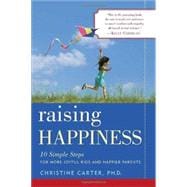
Note: Supplemental materials are not guaranteed with Rental or Used book purchases.
Purchase Benefits
Looking to rent a book? Rent Raising Happiness 10 Simple Steps for More Joyful Kids and Happier Parents [ISBN: 9780345515629] for the semester, quarter, and short term or search our site for other textbooks by Carter, Christine. Renting a textbook can save you up to 90% from the cost of buying.
| Introduction: The Art and Science of Raising Happy Kids | p. ix |
| Put on Your Own Oxygen Mask First | p. 3 |
| Build a Village | p. 21 |
| Expect Effort and Enjoyment, Not Perfection | p. 47 |
| Choose Gratitude, Forgiveness, and Optimism | p. 65 |
| Raise Their Emotional Intelligence | p. 83 |
| Form Happiness Habits | p. 102 |
| Teach Self-Discipline | p. 119 |
| Enjoy the Present Moment | p. 131 |
| Rig Their Environment for Happiness | p. 150 |
| Eat Dinner Together | p. 173 |
| Acknowledgments | p. 187 |
| Notes | p. 189 |
| Bibliography | p. 211 |
| Index | p. 227 |
| Table of Contents provided by Ingram. All Rights Reserved. |
The New copy of this book will include any supplemental materials advertised. Please check the title of the book to determine if it should include any access cards, study guides, lab manuals, CDs, etc.
The Used, Rental and eBook copies of this book are not guaranteed to include any supplemental materials. Typically, only the book itself is included. This is true even if the title states it includes any access cards, study guides, lab manuals, CDs, etc.